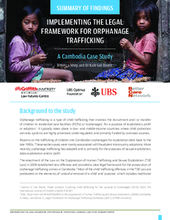This study was conducted as a part of a multi-stage, multi-country project designed to enhance the identification, prosecution, and prevention of orphanage trafficking crimes. It was the second of four stages to be conducted in Cambodia as one of three jurisdictions included in the study.
This second stage of the project comprised socio-legal empirical research designed to examine the in-situ application of the legal framework for prosecuting orphanage trafficking in Cambodia. Specifically, the study sought to identify how cases, where orphanage trafficking and exploitation were indicated, were interpreted, and addressed under law, by relevant authorities.
In addition, it sought to explore the influence of socio-cultural factors on child protection, law enforcement and court officials’ interpretation and decision making, and identify challenges to the uniform application of the law to orphanage trafficking cases.
This report contains a summary of findings from this stage two case data and case study analysis.
Related:
- Implementing the Legal Framework for Orphanage Trafficking: A Cambodia Case Study
- The Legal Framework Of Orphanage Trafficking In Uganda: Enhancing Identification, Prosecution & Prevention
- The Legal Framework of Orphanage Trafficking In Cambodia: Enhancing Identification, Prosecution & Prevention
- The Legal Framework Of Orphanage Trafficking In Nepal: Enhancing Identification, Prosecution & Prevention
- The Legal Framework Of Orphanage Trafficking In Cambodia, Nepal And Uganda: Enhancing Identification, Prosecution & Prevention (Summary Report)

